 ™ ™ |
    
|








Articles |
 |
|
August 2016 - When 10-3=8 June 2016 - Phonics: not always Jolly. See article June 2016 - Our brain see words as pictures. See research June 2016 - Teaching reading - what evidence says. See report May 2016 Seven things to consider before investing in more phonics...See articleApril 2016 - Phonics not a fix all...click for article April 2016 See how some experience dyslexia... Click here
March 2106 New way of thinking about learning to read: research article
February 2015...and I thought I knew how to spell the word "six"...http://youtu.be/J608Dbhs6J8Phonics is not a fix-all drug that will get all children reading ...read more September 2014 - A Different Way of Seeing Things. article linkMarch 2014 - 26% of children failing synthetic phonics. See article August 2014 - Professor Bob Burden, former BDA trustee, argues that dyslexics may be more in need of therapy or counselling than specific teaching interventions. … It may even be that the person with dyslexia is suffering from a surfeit (excess) of phonics...article linkMarch 2014 - UK Dyslexic Pupils not helped by Synthetic Phonics Click hereFebruary 2014 - Why some kids can't spell Click hereJuly 2013 - radio interview Click hereJuly 2013 - Federal Speech in Parliament recognising Dyslexia AustraliaClick here for video (Note: reference should be non-auditory not auditory) July 2013 - Biloela family finds keys to learning to read with dyslexia Click here June 2013 - Our Happy School House (ICPA News and Reviews) Click here for more January 2013 - Video - Championing Dyslexia |
|
August 2012Video - Dyslexia and Perception
Click here for new research - Dyslexic condition turns slime into smile
|
|
May 2012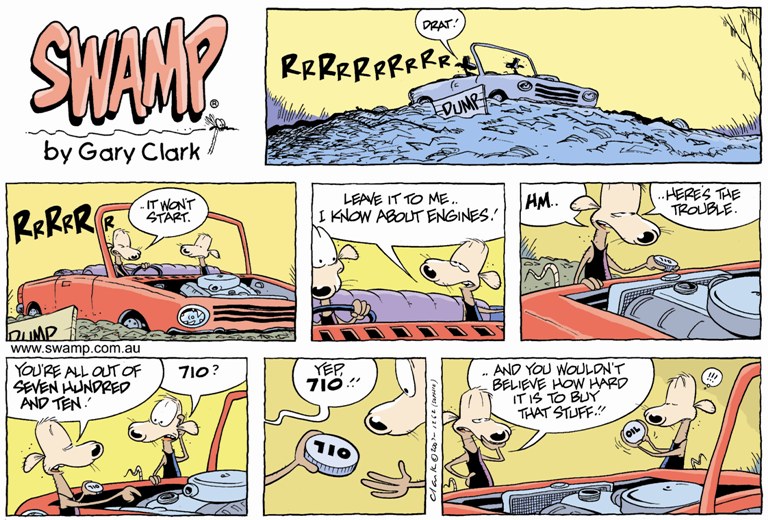
Swamp cartoon used with permission |
|
January 2012Old problem needs new solution. Click here for the article November 2011The visual dictionary idea rebuts the theory that our brain "sounds out" words each time we see them. Interesting study by Neuroscientists at Georgetown University Medical Center (Click here for the article) Breaking News: The phonics method of teaching children to read is not necessary past the initial stages of learning and continuing with it may disadvantage them in the long term...CLICK HERE May 2011 - James Middleton's Speech (read article-click here) |
|
|
January 2010 - Dyslexia Definitions
|
|
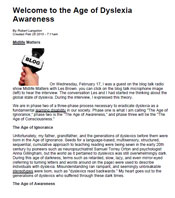 |
February 2010 - Welcome To The Age of Dyslexia AwarenessRead the new article about the Age of Dyslexia and the Global Thinking About the State of Dyslexia. "On Wednesday, February 17, I was a guest on the blog talk radio show Midlife Matters with Les Brown. The conversation Les and I had started me thinking about the global state of dyslexia. During the interview, I expressed this theory. We are in phase two of a three-phase process necessary to eradicate dyslexia as a fundamental learning disability in our society. Phase one is what I am calling "The Age of Ignorance", phase two is "The Age of Awareness", and phase three will be the "The Age of Consciousness"." |
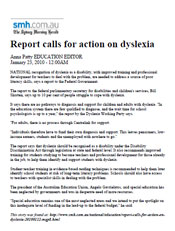 |
January 2010 - Report Calls For Action On Dyslexia
Read the new article about a
new report submitted to the Federal Government about National
Recognition of Dyslexia.
It says there are no pathways to diagnosis and support for
children and adults with dyslexia. ''In the education system
there are few qualified to diagnose, and the wait time for
school psychologists is up to a year,'' the report by the
Dyslexia Working Party says." |
|
|
|
 |
September 2009 - Can you Hear Your Child Cry?
Read a parents poem
Can You Hear Your Child Cry?
Reprinted with permission from the Dyslexic Reader, |
 |
May 2009 - Teacher Brenda Baird helps dyslexic children, adults readRead the
Courier Mail article on how we continue to help children
with Dyslexia. |
 |
May 2009 - What's in a Name
Read the article
What's
in a Name published in the May Edition of the Dyslexic
Reader |
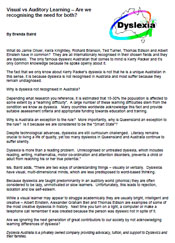 |
August 2008 - Visual vs Auditory Learning
Brenda Baird writes... |
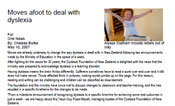 |
June 2007 - Moves afoot to deal with Dyslexia.
New Zealand is recognizing Dyslexia and has asked for expressions of
interest from a variety of sources.
Click here for an extract of an article written for an independent
New Zealand Newspaper One News titled "Moves afoot to deal with
Dyslexia" written by Chelsea Burke, gives an insight into the struggle
made by the Dyslexia Foundation in New Zealand to have Dyslexia
recognised. |
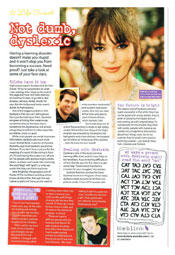 |
December 2004 - DOLLY on Dyslexia
|
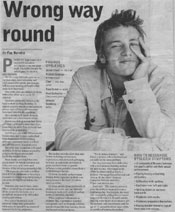 |
January 29, 2004 - Dyslexia with a Twist
"Wrong Way Round" is a thought provoking article published in
Melbourne's Herald Sun on January 29, 2004, and Brisbane's Courier Mail
on January 31, 2004.
Click Here for a look at the article from Brisbane Courier Mail.
|
Articles |
Testimonials |
Links |
Video Links |
Privacy/disclaimer statement
For more information on the program and how we can help you
click here
for an outline of how we help.
Home | Assessment | Solution | Articles & Links | FAQ | About Us | Contact | Blog | Sitemap
©2002-2016 All Rights Reserved
Designed By: Inspirations Designs
